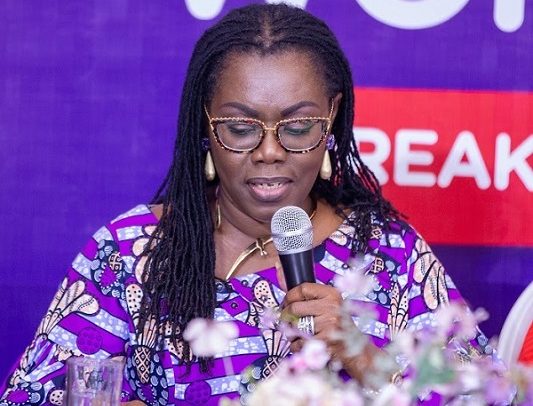Ursula Owusu-Ekuful
Over 1,010 rural telephony sites have been constructed by government to extend mobile network coverage to over 4 million residents of selected unserved and underserved communities.
Minister for Communication and Digitalisation, Ursula Owusu-Ekuful, who made this known at the Ministry of Information’s ‘Meet the Press’ series on Sunday in Accra, said out of a total of 2,016 rural telephony sites to be constructed, 618 of them were already operational, offering essential voice and data services to citizens in about 1,620 rural communities.
“The sites are Ahafo, 34; Ashanti,153; Bono, 36; Bono East, 49; Central, 92; Eastern, 89; Greater Accra, 1; North East, 28; Northern, 58.
“The rest are Oti, 58; Savannah, 50; Upper East, 44; Upper West, 77; Volta, 63; Western, 91; and Western North, 87.
“The Ministry will build the remaining 1,006 sites, integrate, and activate them all for voice and data services to ensure reliable, affordable, and secured broadband infrastructure this year,” she added.
According to the minister, the Rural Telephony Project which symbolises more than just expanded telephony coverage, also represents a significant stride toward a more connected, inclusive, and digitally empowered nation, transforming the lives of citizens in communities that were once unconnected, unserved or underserved.
She said the project has enhanced the ability of residents to communicate with each other and the rest of the world, with improved access to information, and increased connectivity for businesses while facilitating remote learning, digital financial inclusion through mobile banking and mobile money.
She added that not only has the project given access to market information for farmers and businesses to reach their customers, but it has also enhanced the ability of residents to communicate with each other with improved access to information, and increased connectivity for businesses among others.
She said Ghana also took bold steps to implement the ECOWAS free roaming initiative adopted in 2016, with Ghana and Côte d’Ivoire becoming the first ECOWAS countries to implement the ECOWAS free roaming initiative to promote greater integration among member states and decrease roaming charges within the sub-region, despite facing some implementation challenges.
She further debunked assertions that suggested that the e-Services platform and Ghana.gov were the same.
She explained that the e-Services platform was deployed in 2012 under the e-Ghana project as a pilot to produce an e-Government portal to provide relevant government services to citizens and businesses, which had both services and a payment component.
The government discontinued the Ghana E-Services Payment Platform (GEPP) and entered into a partnership with a consortium of three local technology firms (Hubtel, expressPay and IT Consortium) to design, develop, deploy, and manage a one-stop-shop online services platform with an integrated payment gateway for the Government of Ghana, known as Ghana.gov as a result of the failure to achieve its intended purpose.
“These are only three out of numerous ground-breaking strides made by this government in the realm of Information and Communication Technologies (ICTs) which are symbolic of a nation committed to inclusive digital empowerment and economic progress,” she added.
By Ebenezer K. Amponsah

